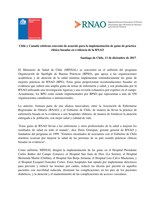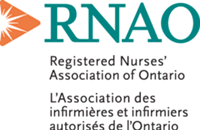Chile and RNAO celebrate agreement to implement clinical best practice guidelines based on evidence
SANTIAGO DE CHILE, Chile, Dec. 11, 2017 /CNW/ - The Ministry of Health of Chile (MINSAL) will become a host for the Best Practices Spotlight Organization (BPSO) program, which supports academic and health-care organizations as they systematically implement best practice guidelines (BPG) from the Registered Nurses' Association of Ontario (RNAO).
These guidelines provide evidence-based recommendations that cover a wide range of nursing and health topics, and are produced by RNAO using rigorous research and thorough review by experts in the field. Currently, the BPGs are being implemented by BPSOs representing more than 550 Canadian and international organizations.
This will be part of an innovative partnership between RNAO and the Government of Chile to bring evidence-based nursing practice to six Chilean hospitals, in order to strengthen the care delivered and support better health and quality of life.
"These RNAO guidelines lead nurses and other health professionals to improve health outcomes around the world," says Doris Grinspun, chief executive officer of RNAO, who founded the BPG program in 1999. "We are delighted to partner with the Government of Chile as it moves forward to improve the health of people in the country using evidence-based clinical practices."
As a host, MINSAL will direct the implementation of the guidelines at el Hospital Presidente Carlos Ibáñez del Campo (Linares), el Hospital San Juan de Dios (La Serena), el Hospital Herminda Martín (Chillán), el Hospital San Borja Arriaran, el Hospital Luis Calvo Mackenna, and el Hospital Exequiel Gonzalez Cortes. These hospitals have chosen to implement guidelines to prevent and reduce injuries from falls, reduce pressure ulcers in patients with limited mobility, reduce foot complications in patients with diabetes, and improve care for vascular access complications.
"Recognizing health as a human right, oriented towards the construction of an integrated, equitable and just society, allows us to identify people as subjects of rights. We believe that becoming a BPSO host and the implementation of evidence-based guidelines will have a positive impact on the health care we provide, which will allow us to continue advancing equity in access and health outcomes," says Dr. Ana Gisela Alarcón Rojas, Deputy of Health for Health Services in Chile.
Ontario's Minister of Health Dr. Eric Hoskins applauds the initiative. "I am proud that RNAO's work is recognized around the world," says Hoskins. "The Ontario government has been a strong partner of the RNAO Best Practice Guidelines Program for almost two decades, and we are delighted with the incredible results it has achieved in our country and abroad."
RNAO is the professional association representing registered nurses, nurse practitioners, and nursing students in Ontario. Since 1925, RNAO has advocated for healthy public policy, promoted excellence in nursing practice, increased nurses' contribution to shaping the healthcare system, and influenced decisions that affect nurses and the public they serve. For more information about RNAO, visit RNAO.ca or follow us on Facebook and Twitter.
SOURCE Registered Nurses' Association of Ontario

To arrange an interview with RNAO's CEO Dr. Doris Grinspun, please contact: Daniel Punch, Communications Officer/Writer, Registered Nurses' Association of Ontario (RNAO), 416-408-5605, [email protected]


Share this article